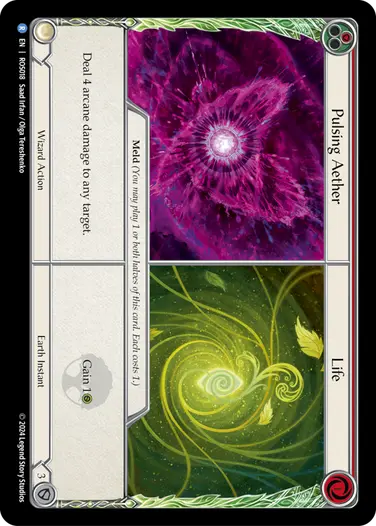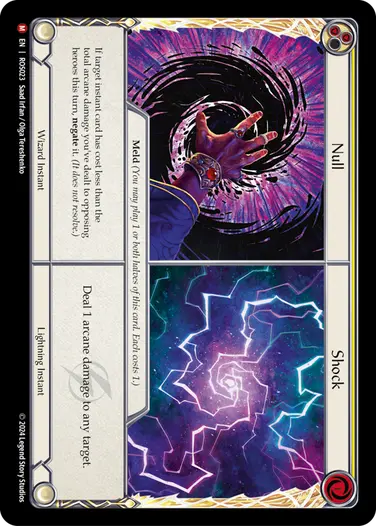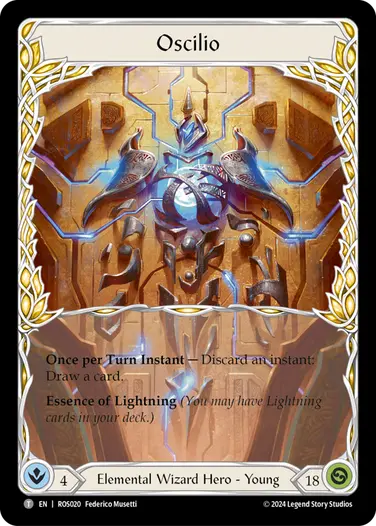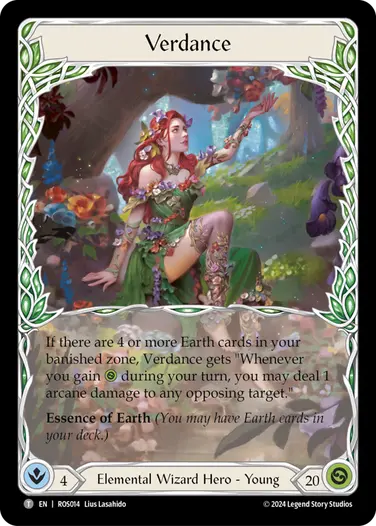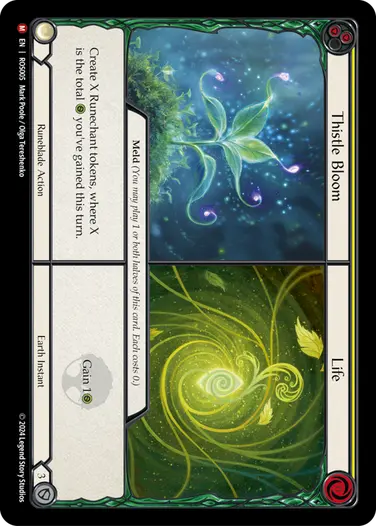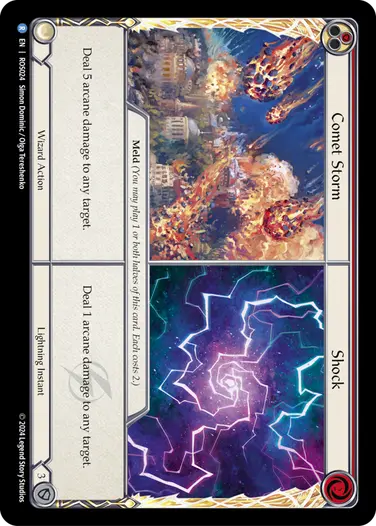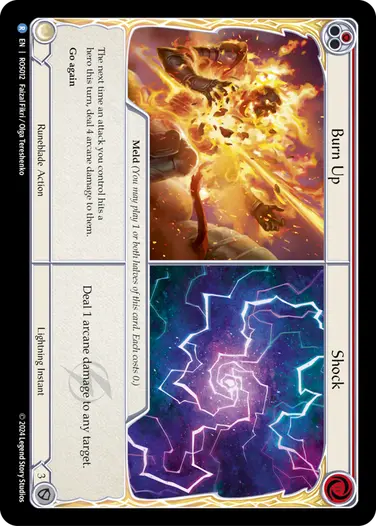With Pro Tour: Amsterdam completed, we are taking a moment to learn more about the exciting split cards revealed during Bryan’s keynote speech. Rules and Policy Manager Joshua Scott and Assistant Rules Manager Niccolo Paqueo are here to give you a rundown on what you can expect from these new cards in Rosetta.
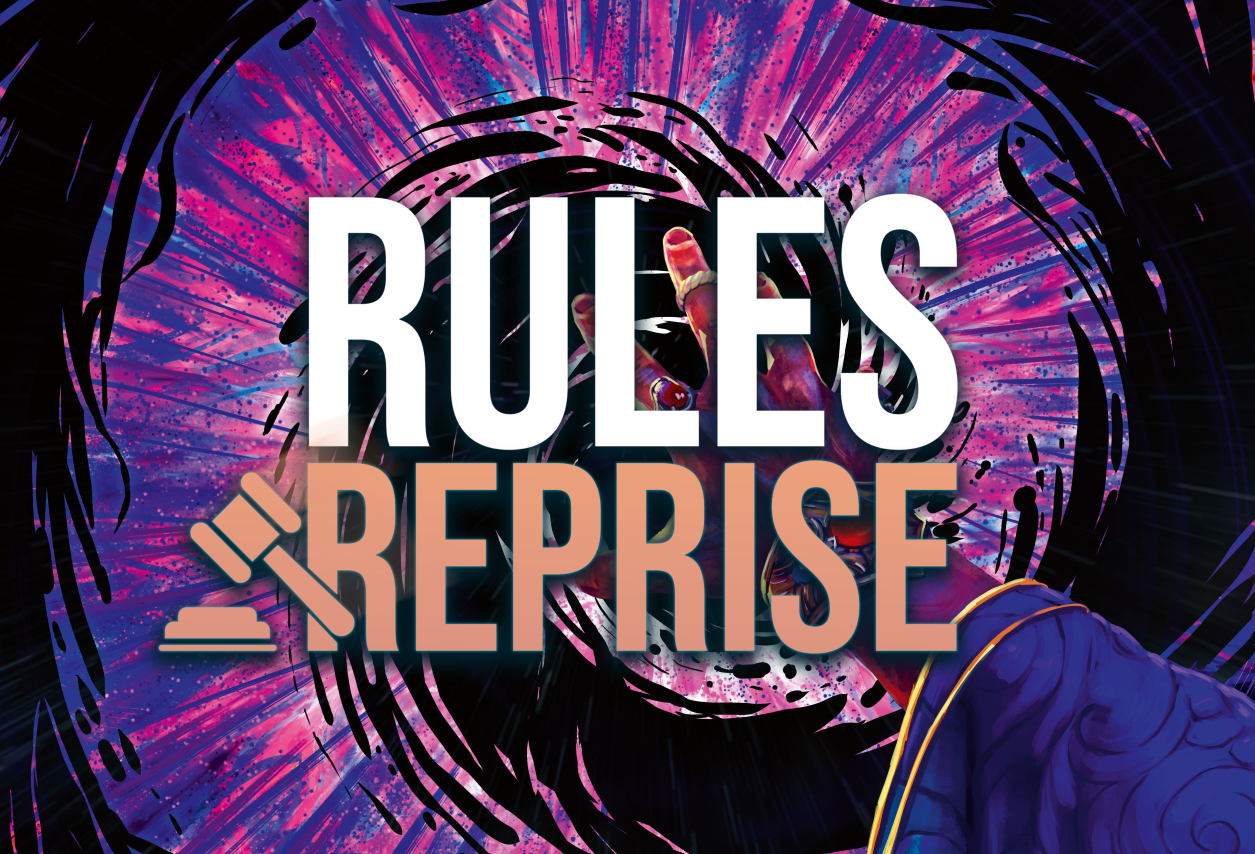
Fast Facts
- A split card can only be included in your deck if you can include both sides.
- You can play one side or the other. If you do, the card has the properties of ONLY that side.
- If you meld, you play a SINGLE card, as a SINGLE layer, that has the properties of BOTH SIDES.
- The resource cost of playing a card with meld starts at twice the base resource cost, then modified by effects.
- Melding an action/instant split card means you have to play it like an action: empty stack and pay 1 action point.
- Melded cards resolve right-side first, then left-side. There is priority between resolutions.
What are split cards?
Split cards are a new type of card featured in Rosetta that bring interesting new deckbuilding options for the Elemental Runeblades and Wizards past, present and future. As you may have noticed already, split cards are distinctive in their layout, with what appears to be a composite of two distinct cards on opposite halves of a card.
However, split cards are not two separate cards; they are cards with two names, text boxes, and type boxes. They are considered a single card with two names and combination of all the properties from its two textboxes and typeboxes, except when they are played. The card has one base cost, one defense value (if any), and one color.
Whether or not a hero can include a split card in their deck follows a simple rule: Players may only include a split card in their hero’s card-pool if their hero allows it to be included with both typeboxes, not just one of them.
Tyler wants to register Null // Shock as part of their card-pool for their next event. For that to happen, Tyler could register their hero as Oscilio as that hero can have “Lightning” and “Wizard” cards in their deck. Unfortunately, Tyler would not be able to register Null // Shock as part of Verdance’s card-pool, because even though Verdance can use "Wizard" cards, that hero cannot use "Lightning" cards.
Split cards introduce new, fascinating decisions for their controller’s turns. When you play a split card, its controller must announce which side of the split card will be played. At that point it is considered to be a single card with the properties (name/textbox/typebox) of only the chosen side. Moreover, you are only allowed to play a split card as one of its halves if it would be a legal play allowed by a game rule or effect.
It’s Tyler’s turn and Nic has a Thistle Bloom // Life in hand. Nic doesn’t have any effects active that would allow them to legally play Thistle Bloom on Tyler’s turn because of its action type. Nic decides to play the Thistle Bloom // Life card and announce that they are playing the card as its Life half. At this point, the card is considered to be just Life, which is an Earth instant card with the ability that gains its controller 1{h}.
What is Meld?
Split cards in Rosetta feature a special keyword ability called meld which offers an additional choice to players. When you play a split card with the meld ability, you must announce if you will meld the split card or announce which side of the split card will be played. If you choose to meld a split card, that card is considered to be a single card with the properties (name/textbox/typebox) of both sides.
With great power comes a great price: When playing a melded split-card, the starting resource cost to play is TWICE the base cost of the card (i.e. you start with paying for the base cost for each side you're playing). Then you apply any cost modifications to the card like those pesky Frostbites.
Important to note, if you want to play a melded card that has the “action” type on one of its sides, you can only do so on an empty stack and it will cost 1 action point, even if the other side has the “instant” type. If an effect would allow you to play the melded card as an instant, you do not need to play it on an empty stack or pay an action point.
Tyler plays Comet Storm // Shock and announces that they will meld the card. At this point, the card being played has the names “Comet Storm” and “Shock” which is a Lightning Wizard Action Instant card with two separate abilities: One ability that deals 1 arcane damage to any target and another ability that deals 5 arcane damage to any target. Tyler chooses Nic for each of those targeted effects. To fulfill its costs, they will have to pay 4 resources and an action point on their turn (unless they have an effect that allows them to play actions as though they were an instant).
Melded split-cards also have a unique resolution process that is special in its design. After playing a melded split card, that card will be placed as a single layer onto the stack; however, this layer will be resolved twice. The first time the layer resolves on the stack, the right-side of the split card will resolve its abilities and generate effects first. The second time the layer resolves on the stack, the left-side of the split card will resolve its abilities and generate their effects. Players get priority between the resolution of each side of the card.
Tyler plays Burn Up // Shock on their turn, having announced that they will meld the card. Tyler targets Nic’s hero with the Shock ability and pays all costs. Tyler adds this melded split card as a layer on the stack and passes priority to Nic, who also passes. The melded card layer resolves for the first time, resolving Shock’s ability first and dealing 1 arcane damage to Nic. Tyler receives priority again with both players passing again in succession. The melded card layer resolves for the second time, resolving Burn Up’s abilities which generates a delayed triggered effect and also provides an action point because of its go again. The layer is then removed from the stack.
That’s it for now. We will be deep diving into the more intricate mechanics and interactions that split cards and meld have with the expansive Flesh and Blood card pool as we get closer to the release of Rosetta. So keep your eyes peeled and enjoy the journey of revisiting Aria and the wonderful domain of Candlehold!
